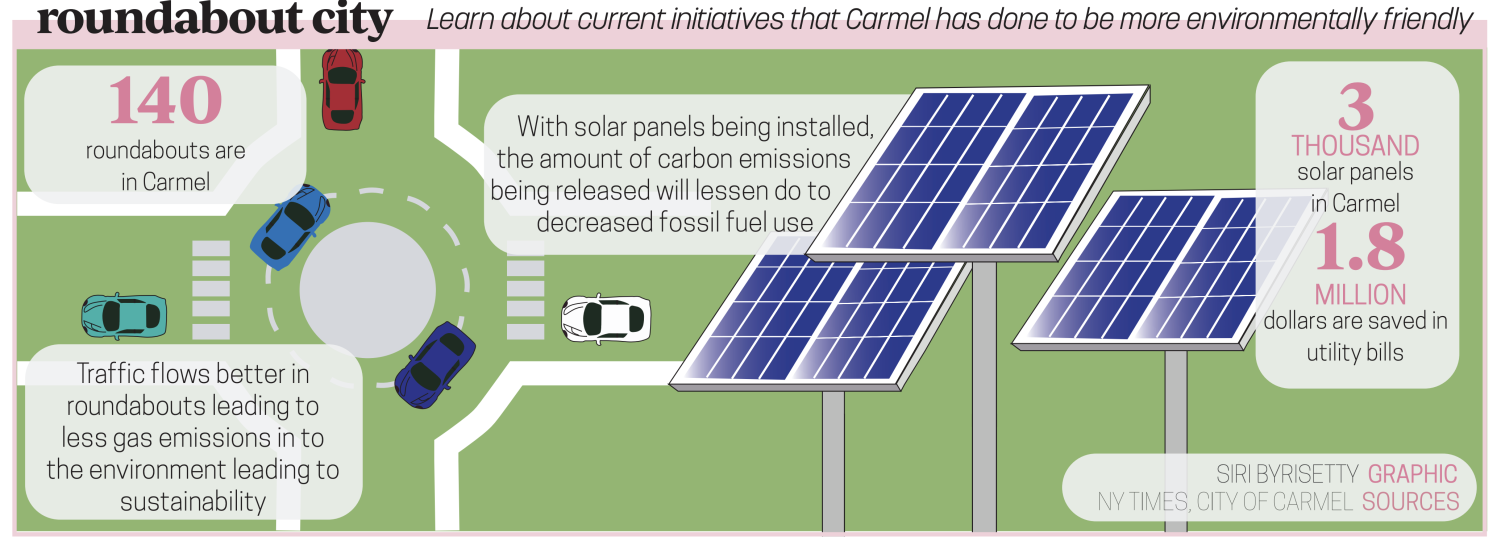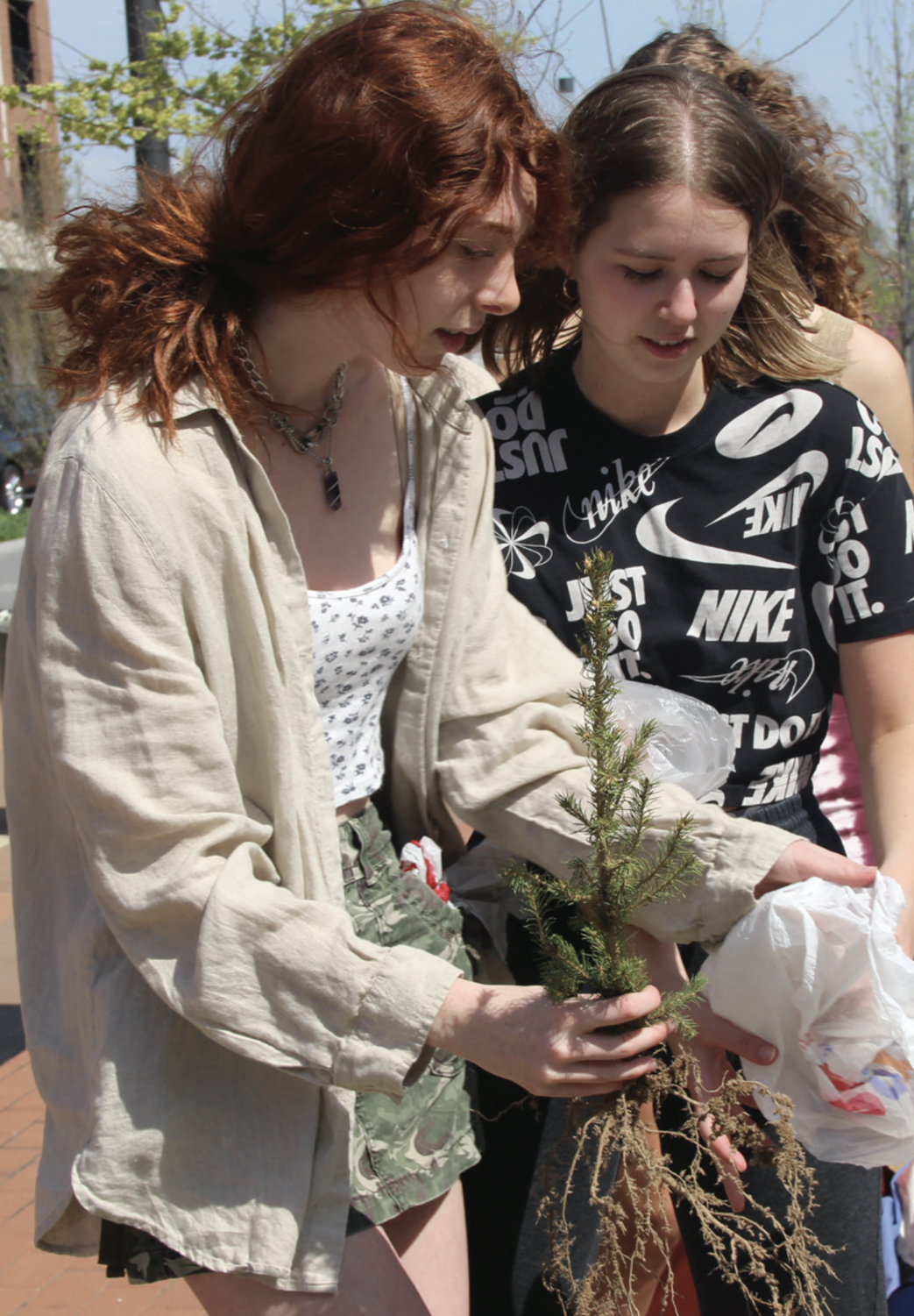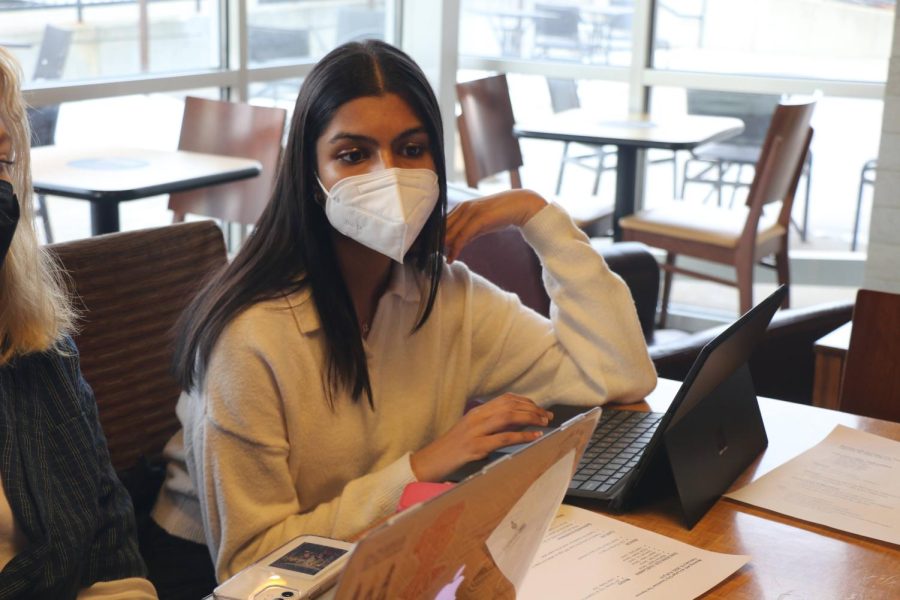Every so often, Julien Doty, member of Green Action Club (GAC) and junior, stops by the Panera Bread on Rangeline Road. Though most students go to Panera to eat and relax, Doty goes for a different reason. Doty is one of many students involved with GAC’s political outreach group, advocating for climate action on a local level. Recently, the group has been meeting with city council members to advocate for a climate action plan in the city of Carmel.
“What surprised me (about meeting with the Carmel City Council) is just how genuine it is,” Doty said about the meetings. “We met up at Panera with a city councilor and just talked about climate change. I think that’s really cool. It definitely is an interesting means of communicating and talking about political issues and challenges with our local representatives.”
According to Leslie Webb, board member of Carmel Green Initiative (CGI), this is not the first time CCS students have called on the city council to address climate change. Webb said CGI’s youth advocacy program, the Promise Project, is composed of many students from GAC, all calling on community leaders to keep their promise to protect the future for youth.
“We started the Promise Project, oh, how long ago? We passed the climate resolution (in) 2017 and we started working two years before that (in 2015),” Webb said. “It was started by a 17-year-old high school student, Maddie Adkins. The goal then was to get the climate resolution passed. It was a unanimous vote in 2017 and since then, the city has conducted a greenhouse gas inventory and that was finished in 2019. It tells you where the emissions are coming from (in the city). The next step is to develop a strategy for reducing carbon emissions. And so, that’s the goal of this Promise Project 2, to make sure that our city establishes effective plans to reduce carbon emissions.”
Grace Belt, co-President of GAC and senior, said the city of Carmel is coming up with a climate action plan to address sustainability. According to Belt, the plan involves many different strategies to reduce carbon emissions in the city.
“The current climate action plan is focused on creating goals for the future and creating a plan to get Carmel to be more environmentally sustainable,” Belt said. “It has a lot of different aspects of sustainability in it, like walkability and there is some (talk) about recycling and composting, but a lot of it is just trying to make our city more sustainable and setting goals for the future.”
Maanya Rajesh, co-President of GAC and senior, said she, Doty and other students have met with many city council members to advocate for the climate action plan. Having seen a draft of the plan, Rajesh said she believes the climate action plan would be beneficial for the entire community and appeal to many different interests.
“I think its versatility is probably the best part about it, and why we think it really has a chance in passing is because it really appeals to different types of people,” she said. “Everyone has their own reasons for wanting the climate action plan. One of the counselors mentioned that some people want sustainability for the business benefits and others want it for the environment and their future. I think the plan does a really good job of appealing to all of those different aspects.”

Doty said he believed it is crucial to have a piece of legislation binding the city to improving the future. In agreement, Belt said she believed the climate action plan was necessary because individual actions won’t reduce carbon emissions at a meaningful level.
“If you look at the biggest things that are influencing climate change, a lot of the time it’s things that are out of the public’s hands,” she said. “There are things that can’t be solved. (For example), emissions by a private company. Creating caps on those is something that can’t be done from an individual level and has to be done from a political (level). The government has (the) power and has the ability to stop these from a grander scale. And then once we have slowed down climate change from larger things that are out of control of the public’s hands, we can then put more focus on how individuals solve this. Individual actions can only do so much until we get them to a grander scale.”
Doty said another important aspect of the climate action plan was its implementation at the city level.
“I think the more we’re all engaged at a local level, we can address climate change where it immediately affects us,” Doty said. “When we all are engaged on a local level, we’re, in a sense, cooperating to address this at the global scale…I think doing that at a local level is the very first step to addressing climate change as a whole.”

According to Webb, the climate action plan doesn’t just lay out strategies for the city government but also introduces more opportunities for climate education.
“There’s a big part of (the plan) that is education, a part of it that is studies, a part of it that’s based on policy changes, and then a part of it that includes some grant funding,” Webb said. “I think (climate) education needs to be a big part of it. I would hope that we were further along on the education piece, but after talking to a few people, it’s clear that more education (is necessary). People need to understand this better. If you don’t understand something you can’t really make the right decisions, understand the urgency.”
Beyond the plan itself, Doty said he has learned a lot about local government. He said he believes it’s crucial for young people to understand civic processes to be more informed citizens.
“Having knowledge of how our government works can help us be better participants in this democratic system and (be) more engaged. When citizens are more engaged in the democratic system, it’s more effective. I think it is important (to get involved), especially starting at a young age,” he said.
Rajesh said she agreed with Doty’s views, but was also disappointed.
“I don’t think we should have to do this,” Rajesh said. “Like, our job is to go to school, it isn’t to have to go and sit in on these meetings and the city council. But unfortunately, in the current state of our world, there’s so many people who don’t believe in climate change and other people who believe in climate change, but then aren’t taking the necessary actions to combat it. And so I think for us, we really realize that this is our future and when the government doesn’t do its job, or even when people who are older than us don’t do their jobs and aren’t really protecting (the world), it kind of falls into our hands. I don’t think it’s something that we should have to do, but unfortunately, it’s something that we are doing.”































![What happened to theater etiquette? [opinion]](https://hilite.org/wp-content/uploads/2025/04/Entertainment-Perspective-Cover-1200x471.jpg)













































![Review: “The Immortal Soul Salvage Yard:” A criminally underrated poetry collection [MUSE]](https://hilite.org/wp-content/uploads/2025/03/71cju6TvqmL._AC_UF10001000_QL80_.jpg)
![Review: "Dog Man" is Unapologetically Chaotic [MUSE]](https://hilite.org/wp-content/uploads/2025/03/dogman-1200x700.jpg)
![Review: "Ne Zha 2": The WeChat family reunion I didn’t know I needed [MUSE]](https://hilite.org/wp-content/uploads/2025/03/unnamed-4.png)
![Review in Print: Maripaz Villar brings a delightfully unique style to the world of WEBTOON [MUSE]](https://hilite.org/wp-content/uploads/2023/12/maripazcover-1200x960.jpg)
![Review: “The Sword of Kaigen” is a masterpiece [MUSE]](https://hilite.org/wp-content/uploads/2023/11/Screenshot-2023-11-26-201051.png)
![Review: Gateron Oil Kings, great linear switches, okay price [MUSE]](https://hilite.org/wp-content/uploads/2023/11/Screenshot-2023-11-26-200553.png)
![Review: “A Haunting in Venice” is a significant improvement from other Agatha Christie adaptations [MUSE]](https://hilite.org/wp-content/uploads/2023/11/e7ee2938a6d422669771bce6d8088521.jpg)
![Review: A Thanksgiving story from elementary school, still just as interesting [MUSE]](https://hilite.org/wp-content/uploads/2023/11/Screenshot-2023-11-26-195514-987x1200.png)
![Review: "When I Fly Towards You", cute, uplifting youth drama [MUSE]](https://hilite.org/wp-content/uploads/2023/09/When-I-Fly-Towards-You-Chinese-drama.png)
![Postcards from Muse: Hawaii Travel Diary [MUSE]](https://hilite.org/wp-content/uploads/2023/09/My-project-1-1200x1200.jpg)
![Review: "Ladybug & Cat Noir: The Movie," departure from original show [MUSE]](https://hilite.org/wp-content/uploads/2023/09/Ladybug__Cat_Noir_-_The_Movie_poster.jpg)
![Review in Print: "Hidden Love" is the cute, uplifting drama everyone needs [MUSE]](https://hilite.org/wp-content/uploads/2023/09/hiddenlovecover-e1693597208225-1030x1200.png)
![Review in Print: "Heartstopper" is the heartwarming queer romance we all need [MUSE]](https://hilite.org/wp-content/uploads/2023/08/museheartstoppercover-1200x654.png)



